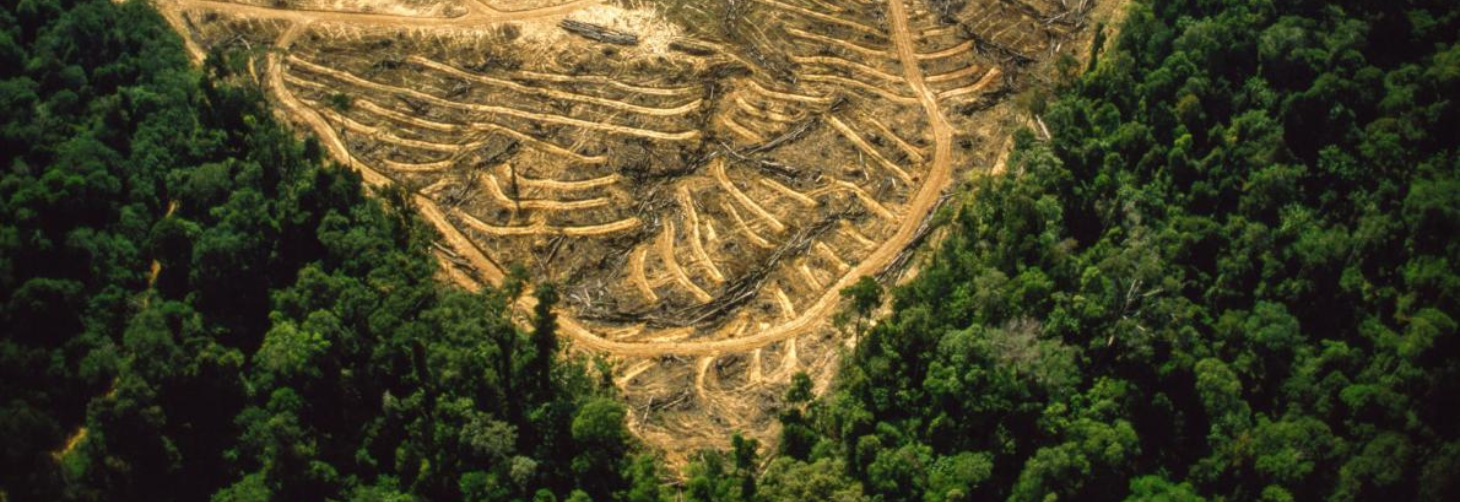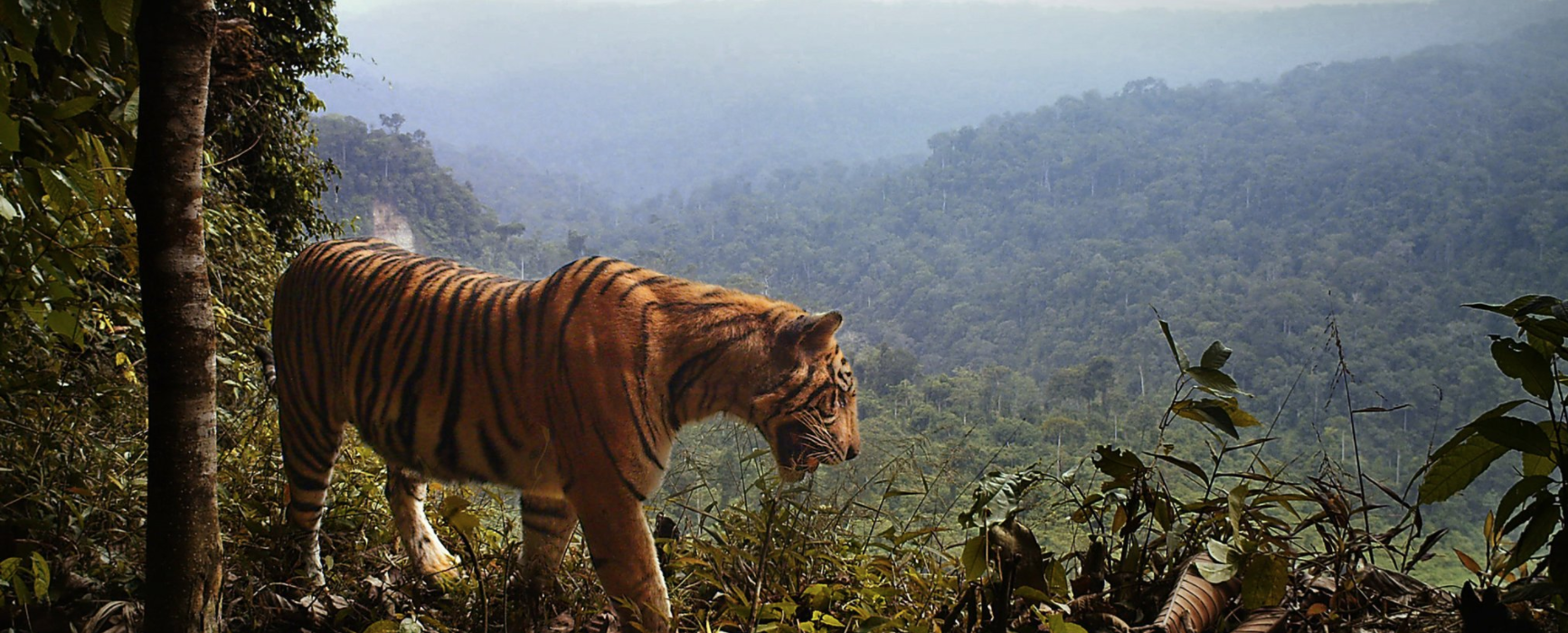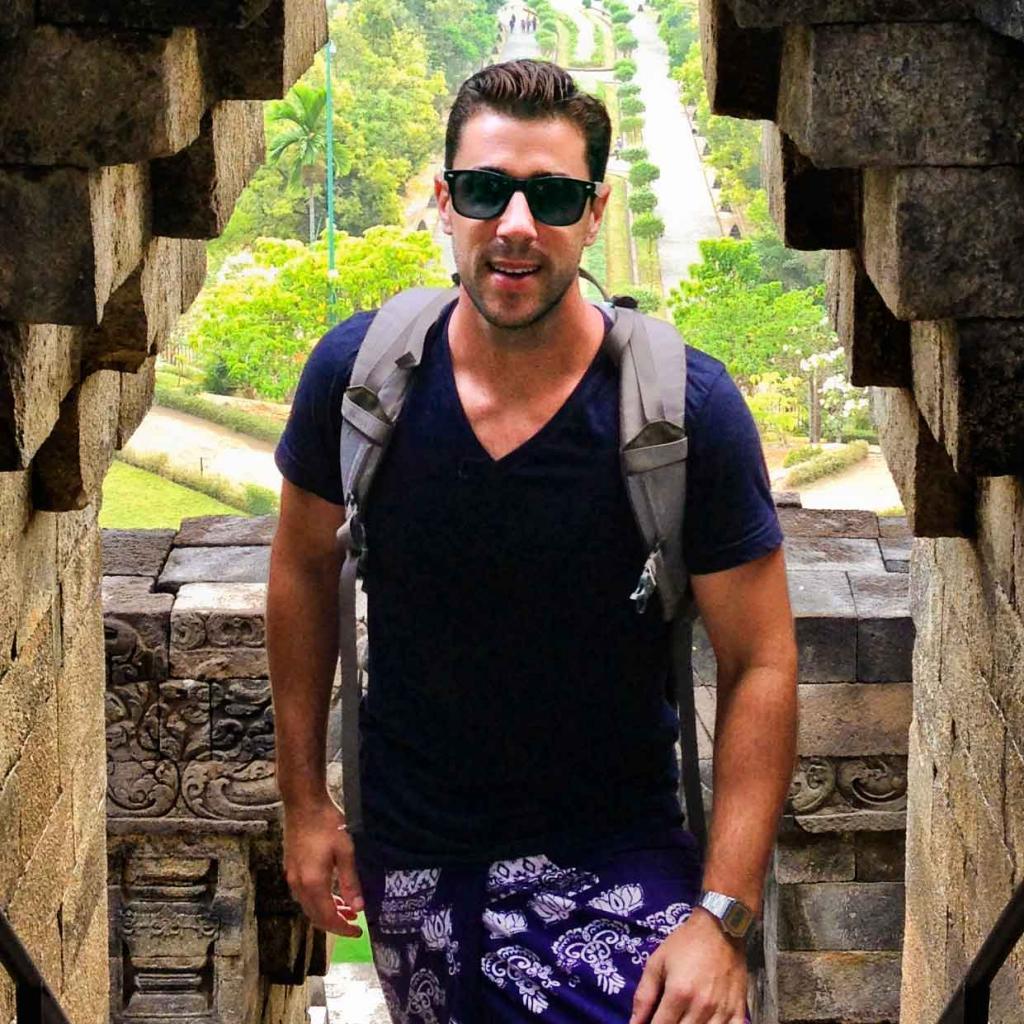Alumnus (PhD awarded in 2016)
Alumnus (PhD awarded in 2016)
Currently a Research Fellow with the Smithsonian Institute's CTFS-ForestGEO program and based in Singapore at Nanyang Technical University, Asian School of the Environment .
Community Ecology, Conservation Biology, Wildlife Ecology, Tropical Rainforests
My research focuses on how humans influence ostensibly pristine tropical forests. My projects have investigated the role of apex predator losses (trophic cascades) and food subsidies available in nearby agricultural areas on forest wildlife communities. My ongoing research links altered wildlife conditions to long-term changes in tree communities. Most of my fieldwork is in Southeast Asian lowland rainforests.
National Geographic coverage of ecological 'subsidy cascades' created by oil palm.  NY Times coverage of work estimating tiger population sizes and threats in Sumatra.
NY Times coverage of work estimating tiger population sizes and threats in Sumatra.  Watch overly dramatic National Geographic video about studying tigers.
Watch overly dramatic National Geographic video about studying tigers.

<p>Nat Geo tiger story</p>
MONGABAY INTERVIEW about how palm oil creates ecological cascades in remaining rainforests

<p>mongabay interview</p>
Education (Download 2017 Curriculum Vitae)
- PhD in Environmental Science, Policy, and Management, UC Berkeley (2016)
- BA Economics and Geography, UCLA (2008) magna cum laude, highest honors
- A decade of fieldwork experience in Indonesia, Malaysia, Thailand, Fiji, and Tahiti.
- Expert user of R for multivariate statistics, including hierarchal modeling using maximum likelihood and Bayesian approaches, advanced meta-regression approaches, and working with biodiversity-specific indexes and analyses.
- Occupancy and density estimation (Bayesian and max likelihood) and single and multi-species models.
- Leadership - I have built and run all projects relating to my first-authored publications, including hiring, training, and managing field teams. I work extensively with regional and local NGOs and national park authorities.
- Teaching - I teach 1-2 weeks per semester for Ecology and Advanced topics in Ecology at Nanyang Technological University. I also lead summer-long undergraduate field courses.
- Proficent in Bahasa Indonesia, Bahasa Malay, Spanish
Peer-reviewed, + indicates that I am the co-first author and am the corresponding author (click for pdfs)
2. Luskin, M.S., Albert, W.R., & Tobler, M.V. (2017). Sumatran tiger survival threatened by deforestation despite increasing densities in parks. Nature Communications 8: 1783, DOI 10.1038/s41467-017-01656-4/.
4. Luskin, M.S. , Lee, J.S.H., Edwards, D., Gibson, L. & Potts, M.D. (2018). A quantitative review of land sparing agricultural production strategies to conserve tropical forest biodiversity. Global Food Security 16, 29-35.
6. Luskin, MS., Ke, A., (2017). The bearded pig. In Melletti, M., & Meijaard, E. (Eds). Ecology, Evolution and Management of Wild Pigs and Peccaries. Implications for Conservation. Cambridge University Press, UK.
7. Ke, A., & Luskin, M. S.+ (2017). Integrating disparate occurrence reports to map data-poor species ranges and occupancy: a case study of the Vulnerable bearded pig Sus barbatus. Oryx 55: 1-11.
References
- Stuart Davies, director of Smithsonian's CTFS-ForestGEO program; (201) 633-0961; daviess@si.edu
- David Wardle, professor at NTU, david.wardle@ntu.edu.sg
- Matthew Potts, phd advisor at UC Berkeley (510) 642-5580; mdpotts@berkeley.edu
- Thomas Gillespie, phd advisor at UCLA (310) 825-1818; tg@ucla.geog.edu
- Claire Kremen, phd committee at UC Berkeley (510) 643-6339; ckremen@berkeley.edu
- Justin Brashares, phd committee at UC Berkeley (510) 643-6080; brashares@berkeley.edu
- PI: National Geographic Society
- Committee for Research and Exploration
- 13,000 initial (2013), $10,000 extension (2014)
- Fulbright Scholar
- Indonesia Research Fellowship ($20,000, 2013-2014)
- *Science, Tech and Engineering
- NSF Graduate Research Fellowship Program
- $121,500 total, tenure from 2010-2015
- Philomathia Fellowship in Environmental Leadership
- $20,000 initial (2014),$20,000 continuance (2015)
- Distinguished Graduate Student Lecture (2015)
- awarded annually to one finishing PhD candidate in ESPM
- Outstanding GSI Award
- awarded to top 9% of Graduate Student Instructors
- PI: ZGAP Species and Populations Conservation Grant -$2100, 2014
- PI: Columbus Zoo Conservation Award - $5000, 2014
- PI: Los Angeles Zoo Conservation Grant - $2500, 2014
- PI: Swift International Research Award - $2500, 2012
- PI: Bat Conservation International - $1000, 2013
- Foreign Language and Area Studies Fellowship (U.S. Dept of Education) - $7000, 2013
- PI: National Geographic Society
Graduate Student Instructor for “Wildlife Ecology”, UC Berkeley, Department of Integrative Biology Fall 2016 [c158 with Professor Justin Brashares)
Graduate Student Instructor for “Conservation Biology”, UC Berkeley, Department of Integrative Biology Fall 2015 [c158 with Professor Steve Beissinger)
Graduate Student Instructor for “Advanced Conservation Biology: Conservation in Working Landscapes”, UC Berkeley Spring 2015 [ESPM 158 with Professor Claire Kremen]
Graduate Student Instructor for "Biology of Tropical Islands",UC Berkeley Fall 2012 (http://ib.berkeley.edu/moorea/UC_Berkeley_Moorea_Class.html)
Invited lecture: "SE Asian trophic cascades" at the National University of Singapore, Biological Sciences Seminar Series (2013)
Invited lecturer in "Wildlife Ecology" at the Universitas Andalas (Padang, Sumatra) (2013, 2014)
Invited guest lecturer for "Forest Ecosystem Management", UC Berkeley (2011, 2012)
Invited guest lecturer for "Food Systems", UC Berkeley (2011, 2013)
Peer Reviewer for Applied Ecology, Forestry Review, Journal of Tropical Forest Science, Biological Conservation, Human Ecology, Climate Change, Biotropica, Journal of Applied Ecology, PLoS1
~Academic Biography~
My interest in research began as an undergraduate at UCLA while conducting a project on the Yasawa archipelago of Fiji in 2007. To our suprise, I found that native frugivorous bats were thriving despite deforestation of 97% of the islands (Luskin 2010). Their survival actually depended on feeding in farmland, a result that led me to my dissertation topic on wildlife conservation in agricultural landscapes. My undergraduate thesis advisors, Dr. Hartmut Walter and Dr. Thomas Gillespie, were instrumental in this project and my decision to apply to graduate school.
After joining Dr. Matthew Potts’ lab at UC Berkeley in 2009, I worked with the Forestry Research Institute of Malaysia (FRIM) in a remote logging camp near the Thailand-Malaysia border to conduct biodiversity sampling for an improved logging project (www.cbiod.org).
I returned to Malaysia again to begin my dissertation research in 2010, starting a project to understand how habitat conditions within oil palm plantations may affect wildlife (Luskin & Potts 2011; another manuscript in prep on arthropods, reptiles and bats). This work was aided by a variety of UC Berkeley undergraduates, including my mentees Elaine West, Tara DiRocco, and Mikaela McCarthy.
From 2011 to 2012, I led a study on modern hunting practices in the plantation landscapes of Sumatra, Indonesia (Luskin et al. 2013 Human Ecology). This research describes a new and thriving commercial hunting and trade of wild boar (Sus scrofa), largely due to changing ecological and demographic conditions associated with oil palm expansion. The interviews were conducted by native Sumatran and UC Berkeley undergraduate Evelyn D. Christina.
In Spring 2012 I travelled to Moorea in French Polynesia (next to Tahiti) to become a Graduate Student Instructor for the UC Berkeley semester-long field course, “Biology of Tropical Islands.”
In 2013 I returned to my favorite archipelago, Indonesia, this time as a National Geographic Society Explorer and Fulbright scholar to lead a study on conserving Sumatran tigers and their prey. We hypothesize that where tigers are lost, food web structures begins to collapse, instigating a "trophic cascade" enabling prey species to become more abundant. I split my time living in each of Sumatra's three UNESCO World Heritage Site forests. With my amazing team of 22 full and part-time rangers and local villagers, we undertake 1-3 week expeditions setting and retrieving motion-activated cameras placed throughout the forest, primarily aimed to capture tigers and their prey.This project is funded by a number of USA and international conservation organizations and zoos, and is a collaboration with many scientists and NGOs, including Dr. Matthew Linkie (FFI), Dr. Noviar Andayani (WCS), Tarmizi (Leuser International Foundation), Dr. Pk Wilson from the U of Andalas in Padang, and Yoan Dinata (FFI-Kerinci). I also worked remotely as a biologist with the Leuser International Foundation based in Medan, North Sumatra.
Between field seasons, I work on conceptual models to identify the optimal approaches to increasing agricultural production while minimizing the loss of tropical forests and biodiversity (land sparing versus land sharing debate).
I will finish my PhD in May 2016 and hope to continue researching and teaching wildlife ecology, tropical ecology, and conservation biology as a professor.


